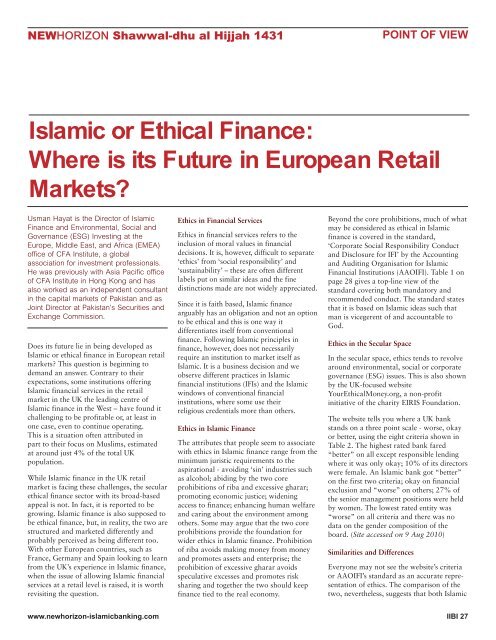NEWHORIZON
NEWHORIZON - Institute of Islamic Banking and Insurance
NEWHORIZON - Institute of Islamic Banking and Insurance
- No tags were found...
You also want an ePaper? Increase the reach of your titles
YUMPU automatically turns print PDFs into web optimized ePapers that Google loves.
<strong>NEWHORIZON</strong> Shawwal-dhu al Hijjah 1431<br />
POINT OF VIEW<br />
Islamic or Ethical Finance:<br />
Where is its Future in European Retail<br />
Markets?<br />
Usman Hayat is the Director of Islamic<br />
Finance and Environmental, Social and<br />
Governance (ESG) Investing at the<br />
Europe, Middle East, and Africa (EMEA)<br />
office of CFA Institute, a global<br />
association for investment professionals.<br />
He was previously with Asia Pacific office<br />
of CFA Institute in Hong Kong and has<br />
also worked as an independent consultant<br />
in the capital markets of Pakistan and as<br />
Joint Director at Pakistan’s Securities and<br />
Exchange Commission.<br />
Does its future lie in being developed as<br />
Islamic or ethical finance in European retail<br />
markets? This question is beginning to<br />
demand an answer. Contrary to their<br />
expectations, some institutions offering<br />
Islamic financial services in the retail<br />
market in the UK the leading centre of<br />
Islamic finance in the West – have found it<br />
challenging to be profitable or, at least in<br />
one case, even to continue operating.<br />
This is a situation often attributed in<br />
part to their focus on Muslims, estimated<br />
at around just 4% of the total UK<br />
population.<br />
While Islamic finance in the UK retail<br />
market is facing these challenges, the secular<br />
ethical finance sector with its broad-based<br />
appeal is not. In fact, it is reported to be<br />
growing. Islamic finance is also supposed to<br />
be ethical finance, but, in reality, the two are<br />
structured and marketed differently and<br />
probably perceived as being different too.<br />
With other European countries, such as<br />
France, Germany and Spain looking to learn<br />
from the UK’s experience in Islamic finance,<br />
when the issue of allowing Islamic financial<br />
services at a retail level is raised, it is worth<br />
revisiting the question.<br />
Ethics in Financial Services<br />
Ethics in financial services refers to the<br />
inclusion of moral values in financial<br />
decisions. It is, however, difficult to separate<br />
‘ethics’ from ‘social responsibility’ and<br />
‘sustainability’ – these are often different<br />
labels put on similar ideas and the fine<br />
distinctions made are not widely appreciated.<br />
Since it is faith based, Islamic finance<br />
arguably has an obligation and not an option<br />
to be ethical and this is one way it<br />
differentiates itself from conventional<br />
finance. Following Islamic principles in<br />
finance, however, does not necessarily<br />
require an institution to market itself as<br />
Islamic. It is a business decision and we<br />
observe different practices in Islamic<br />
financial institutions (IFIs) and the Islamic<br />
windows of conventional financial<br />
institutions, where some use their<br />
religious credentials more than others.<br />
Ethics in Islamic Finance<br />
The attributes that people seem to associate<br />
with ethics in Islamic finance range from the<br />
minimum juristic requirements to the<br />
aspirational - avoiding ‘sin’ industries such<br />
as alcohol; abiding by the two core<br />
prohibitions of riba and excessive gharar;<br />
promoting economic justice; widening<br />
access to finance; enhancing human welfare<br />
and caring about the environment among<br />
others. Some may argue that the two core<br />
prohibitions provide the foundation for<br />
wider ethics in Islamic finance. Prohibition<br />
of riba avoids making money from money<br />
and promotes assets and enterprise; the<br />
prohibition of excessive gharar avoids<br />
speculative excesses and promotes risk<br />
sharing and together the two should keep<br />
finance tied to the real economy.<br />
Beyond the core prohibitions, much of what<br />
may be considered as ethical in Islamic<br />
finance is covered in the standard,<br />
‘Corporate Social Responsibility Conduct<br />
and Disclosure for IFI’ by the Accounting<br />
and Auditing Organisation for Islamic<br />
Financial Institutions (AAOIFI). Table 1 on<br />
page 28 gives a top-line view of the<br />
standard covering both mandatory and<br />
recommended conduct. The standard states<br />
that it is based on Islamic ideas such that<br />
man is vicegerent of and accountable to<br />
God.<br />
Ethics in the Secular Space<br />
In the secular space, ethics tends to revolve<br />
around environmental, social or corporate<br />
governance (ESG) issues. This is also shown<br />
by the UK-focused website<br />
YourEthicalMoney.org, a non-profit<br />
initiative of the charity EIRIS Foundation.<br />
The website tells you where a UK bank<br />
stands on a three point scale - worse, okay<br />
or better, using the eight criteria shown in<br />
Table 2. The highest rated bank fared<br />
“better” on all except responsible lending<br />
where it was only okay; 10% of its directors<br />
were female. An Islamic bank got “better”<br />
on the first two criteria; okay on financial<br />
exclusion and “worse” on others; 27% of<br />
the senior management positions were held<br />
by women. The lowest rated entity was<br />
“worse” on all criteria and there was no<br />
data on the gender composition of the<br />
board. (Site accessed on 9 Aug 2010)<br />
Similarities and Differences<br />
Everyone may not see the website’s criteria<br />
or AAOIFI’s standard as an accurate repre -<br />
sentation of ethics. The comparison of the<br />
two, nevertheless, suggests that both Islamic<br />
www.newhorizon-islamicbanking.com IIBI 27
















